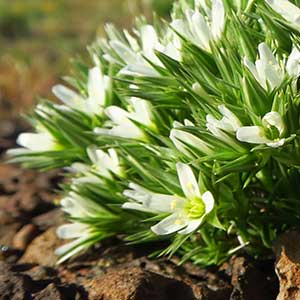Eremogone franklinii
Eremogone eastwoodiae
Franklin's sandwort
Eastwood's sandwort
erect, 3–10(–15) cm, glabrous.
erect, (8–)10–25 cm, glabrous or stipitate-glandular.
basal leaves persistent;
cauline leaves in 6–10 pairs, closely overlapping, not reduced;
basal blades arcuate-spreading, needlelike, (0.6–)1–2 cm × ca. 1 mm, ± rigid, herbaceous, apex spinose, glabrous, not glaucous.
basal leaves persistent;
cauline leaves usually in 2–4 pairs, reduced distally;
basal blades spreading to recurved, needlelike, 1–3(–3.5) cm × 0.5–0.7 mm, flexuous to rigid, herbaceous, apex spinose, glabrous to puberulent, not glaucous.
3–45+-flowered, usually congested, subcapitate cymes.
(1–)3–17-flowered, ± open cymes.
ca. 0.1–3(–4) mm, glabrous.
3–30 mm, glabrous or stipitate-glandular.
sepals 1–3-veined, linear-lanceolate, (5–)8.5–12 mm, not enlarging in fruit, margins narrow, apex acuminate, glabrous;
petals white, oblong-lanceolate to narrowly spatulate, 7–9 mm, 0.8–1.1 times as long as sepals, apex rounded to blunt;
nectaries not apparent.
sepals green or purplish, 1–3-veined, lanceolate to ovate-lanceolate, (3.5–)4–6.5 mm, not enlarging in fruit, margins broad, apex narrowly acute to acuminate, glabrous or stipitate-glandular;
petals yellowish white or sometimes brownish to reddish pink, broadly oblong-elliptic to oblanceolate, 4–6.5 mm, 0.9–1.1 times as long as sepals, apex rounded;
nectaries narrowly longitudinally rectangular, apically cleft or emarginate, adjacent to filaments opposite sepals, 1–2 mm.
2.3–3.3 mm, glabrous.
4–6 mm, glabrous.
black, pyriform, 1.2–1.7 mm, tuberculate.
brown, ovoid to suborbicular with hilar notch, 1.2–1.7 mm, papillate, subechinate;
tubercles conical.
Eremogone franklinii
Eremogone eastwoodiae
Varieties 2 (2 in the flora).
(Discussion copyrighted by Flora of North America; reprinted with permission.)
Varieties 2 (2 in the flora).
The Hopi Indians may use Eremogone eastwoodiae as an emetic (B. Maguire 1960).
The nectaries in Eremogone eastwoodiae are different from those of most other species of the genus in North America since they are a separate bilobed structure adjacent to, but not a direct enlargement of, the filament bases opposite the sepals.
(Discussion copyrighted by Flora of North America; reprinted with permission.)
1. Inflorescences tightly congested cymes; pedicels 0.1-1(-3) mm; sepals 8.5-12 mm; petals 0.8-0.9 times as long as sepals | var. franklinii |
1. Inflorescences somewhat congested cymes; pedicels 1-4 mm; sepals 5-8 mm; petals 1-1.1 times as long as sepals | var. thompsonii |
1. Stems and pedicels glabrous | var. eastwoodiae |
1. Stems and pedicels stipitate-glandular | var. adenophora |
- Local floras:
OR,
WA
- Local Web sites:
CalFlora,
CalPhotos,
Flora NW,
PNW Herbaria
WildflowerSearch
iNaturalist (observations)
- LBJ Wildflower Center
- SEINet
- Plants of the World Online
- Encyclopedia of Life
- Wikipedia
- Google Image Search


